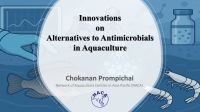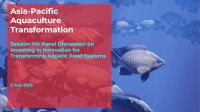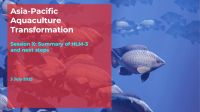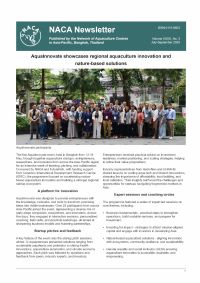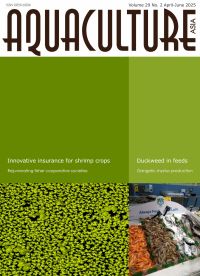This video by Chokanan Prompichai, NACA, presents two promising innovations aimed at reducing antimicrobial use (AMU) in aquaculture, showcased as part of Thailand’s National Innovation and Investment Plan (NIIP) and via the IDRC-funded InnoVet-AMR 2.0 Project. NanoVac, developed by AIT, uses nanobubbles to deliver vaccines to tilapia, while ShrimpGuard, developed by BIOTEC and KU, is a bacteriophage-based solution for managing shrimp diseases. Both technologies offer potential to combat antimicrobial resistance (AMR) without leaving chemical residues. The presentation compares their readiness, challenges, and adoption, incorporating feedback from shrimp farmers across Thailand. It highlights the need for cost-effective, easy-to-use solutions that align with farmers' real-world needs and regulatory frameworks.
This video by Tipparat Pongthanapanich, FAO, is focussed on the critical role of investment in transforming aquatic food systems. The discussion explores strategies to mobilise finance from private capital, public investment, and development finance to meet the region’s substantial innovation needs. Topics include how to support SMEs and start-ups, bridge early- to late-stage funding gaps, and manage investment risks. With Asian aquaculture dominating global production but receiving limited venture capital, the session calls for coordinated action to unlock the sector’s full potential for sustainable growth, jobs, and food security.
This video presents a summary of key insights and forward-looking actions from the closing session of the 3rd High-Level Meeting on Aquaculture Transformation in the Asia-Pacific Region. It highlights the critical role of low-cost fish for food security, the need for intuitive technologies suited to smallholders, and the barriers posed by regulation and financing gaps. Key themes include the importance of genetic improvement, knowledge-based farming, improved access to expertise, and alignment of incentives for sustainable and profitable aquaculture. The session emphasises inclusive investment strategies, farmer integration into financial systems, and the need for regional coordination and collaboration to drive transformation through 2030.
In this issue:
- AquaInnovate showcases regional aquaculture innovation and nature-based solutions.
- Knowledge brokering for nature-based solutions in aquaculture.
- 5th INFOFISH World Tilapia Trade and Technical Conference & Exhibition 2025.
- 12th Symposium on diseases in Asian Aquaculture 23-27 September 2025, Chennai, India.
- Reported Aquatic Animal Diseases in the Asia-Pacific Region during the Fourth Quarter of 2024.
In this issue:
- From risk to resilience: Innovative crop insurance solutions for securing shrimp aquaculture in India
- Efforts to rejuvenate primary fisher cooperative societies in South 24 Parganas District, West Bengal
- Captive production of Gangetic mystus (Mystus cavasius): A guide for farmers
- Shrimp farm biosecurity in Saudi Arabia: A journey from past practices to future vision
- Wolffia globosa (duckweed) in aquafeeds for profitability and eco-friendly sustainable aquaculture
- NACA Newsletter
